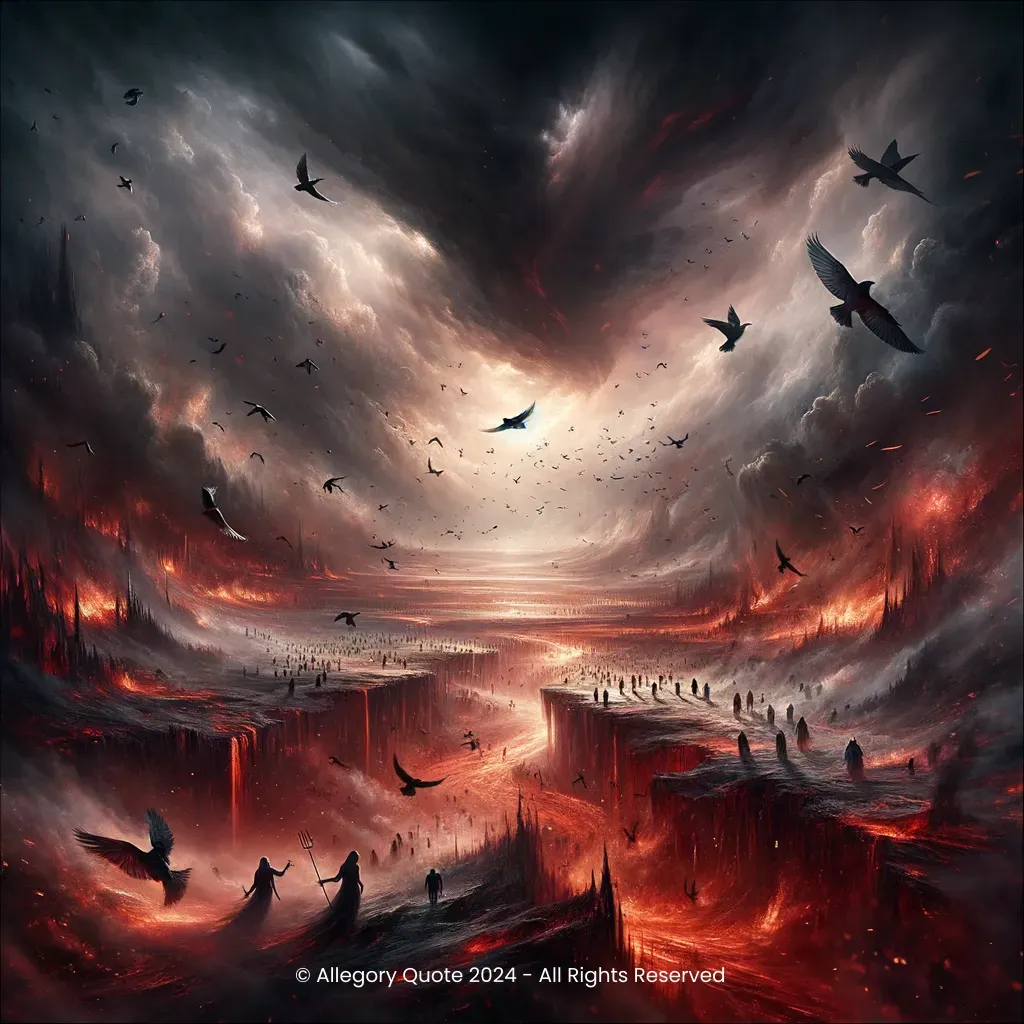”And as the starlings are borne on their wings,
in the cold season, in a broad and full troop,
so does that blast bear the evil spirits along“

- Meaning
- The meaning of this phrase is deeply connected to the description of the punishment of the lustful in Dante's Inferno. The "evil spirits" are the sinners, who in this context are swept away like starlings, birds that fly together in large flocks, by the impetuous infernal winds. This symbolizes their lack of control and the unstoppable force of their passions, which led them to eternal damnation.
- Allegory
- The allegorical image describes elements such as the infernal storm and the starlings in flight to visually represent the sweeping of spirits as revealed by Dante's phrase. The swirling winds symbolize the power of uncontrollable passions, while the dark background of the Inferno evokes the bleak and punitive atmosphere of the punishments described in "The Divine Comedy". The red color represents both the fire of passions and that of Hell, while the incessant motion captures the constant struggle of the sinners swept by their sin. The composition is intended to evoke deep reflection on moral choices and human destiny, thus promoting a broader understanding of the concept illustrated.
- Applicability
- The meaning of the phrase can be applied to personal life as a warning about the importance of governing one's passions and desires. Being uncontrollably swept away by one's impulses can lead to negative consequences and a loss of control over one's life. Since the "blasts" that drive the spirits are inevitable and powerful, one can reflect on the necessity of finding balance and measure in one's behavior.
- Impact
- The phrase, as part of "The Divine Comedy," has had a significant impact on global culture and literature. Dante's work is considered a cornerstone of Italian literature and has influenced numerous authors, artists, and thinkers throughout the centuries. The vivid descriptions of punishments and virtues in Inferno, Purgatory, and Paradise have spurred reflections on morality and the human condition throughout history.
- Historical Context
- "The Divine Comedy" was written between 1308 and 1320, during the medieval period. The historical context in which Dante writes spans an Italy fragmented by political and social conflicts, and the work reflects the theological and philosophical thought of the time. Dante, exiled from Florence for political reasons, infuses a strong sense of moral and spiritual justice into his writings.
- Criticisms
- There have been no significant critiques specifically related to this phrase. However, Dante's entire work has been subject to various interpretations and critical discussions, especially regarding the moral rigor with which Dante judges the sinners. Some might find the allegorical and symbolic treatment overly severe or simplistic.
- Variations
- Variations of this phrase can be found in different interpretations and translations of "The Divine Comedy". However, being a medieval work, there are other cultural versions that address the theme of punishment and control of passions, although not always in a similar manner. For instance, in Eastern literature, there are many reflections on how passions can lead to a state of inner chaos.
-

In the midst of chaos, there is also opportunity.
-

O imagination, that sometimes steals us so, from outside things, that we pay no attention, though someone might be present who hears a bell or a horn, within you!
-

Do unto others as you would have them do unto you.
-

Your will is free, upright, and whole; henceforth, you act according to its discretion. Therefore, I crown and mitre you over yourself.
-

He had already reached the place where the roar of water falling into the next circle could be heard, similar to the buzzing of beehives.
-

Ah, how hard it is to describe this rough and harsh and dense forest, which renews fear in my thoughts!
-

And I: 'Master, what is so heavy that it makes them lament so strongly?'.
-

And just as someone who, with laboring breath, has escaped the sea to reach the shore, turns back to gaze at the perilous waters.
-

I saw such a long throng of people, I would not have believed death had undone so many.
-

Love, which absolves no loved one from loving, seized me so strongly with his charm that, as you see, it does not leave me even now.
No Comments